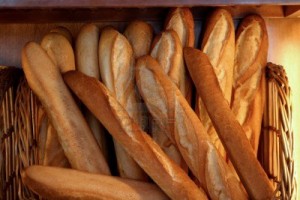By Libya Herald journalist.

Tunis, 6 March 2015:
The Price Stability Fund has revealed that it has discovered that there are bakeries in . . .[restrict]Tripoli that have been receiving state subsidized flour for bread that have been closed for seven years, the GNC-Libya Dawn LANA news agency reports.
The Price Stability Fund is the body in charge of paying the difference between market prices and subsidized prices to entities
The report also reveals that Libya’s annual bill for subsidized flour is LD 1.3 billion, and that 8.9 million Libyans are registered in consumer cooperatives as receiving subsidized goods – 2.9 million more than the country’s population.
All Libyan citizens are entitled to receive a set amount of subsidized staple foods from their cooperative using a monthly ration book. The list of these goods has changed over time, but has historically included flour, pasta, rice, sugar, tea, tomato paste, cooking oil and tea.
Revealing the extent of corruption and the abuse of state subsidies, the Price Stability Fund disclosed that out of the 223 bakeries inspected in Tripoli, 94 were found not to have been operating, yet were still continuing to receive their monthly rations of subsidized flour.
The report also confirmed earlier news that the country has only three months’worth of flour reserves. As a result, bakeries were only being supplied with 50 percent of their needs and there is a danger of bread shortages. Earlier reports of bread shortages in both the west and east were attributed to power cuts and the departure of Egyptian bakers.
However, now, flour that had been supplied to fake bakeries will now be used to supply operating bakeries with their normal rations.
The Price Stability Fund also revealed that it is considering setting a special price for cake, pastry, pasta and pizza makers – a sector that is a large illegal recipient of state subsidized flour.
The report says that the reason that middlemen are able to usurp subsidized flour and exploit the system is the lack of use of the National ID Number by consumer cooperatives.
The report says that the Price Stability Fund will in future insist on the use of the National ID Number by consumer cooperatives in the distribution of subsidized food stuffs so as to enable the state to accurately assess the number of Libyans using cooperatives.
The report called for the public’s cooperation in the economic use of subsidized goods as well as calling on the public to report bakeries that are not operating.
The Price Stability Fund further revealed that there were no new contracts signed for the import of subsidized foodstuffs for 2015 – except for flour. Moreover, the report said that it had no further news on plans to either partially or fully cancel subsidies, or to substitute subsidies with cash payments.
It will be recalled that both political camps in Libya have come round to the need for subsidy reform, thanks to Libya’s economic crises, in order to save on the exploitation of subsidized goods thought to be in the billions. [/restrict]







